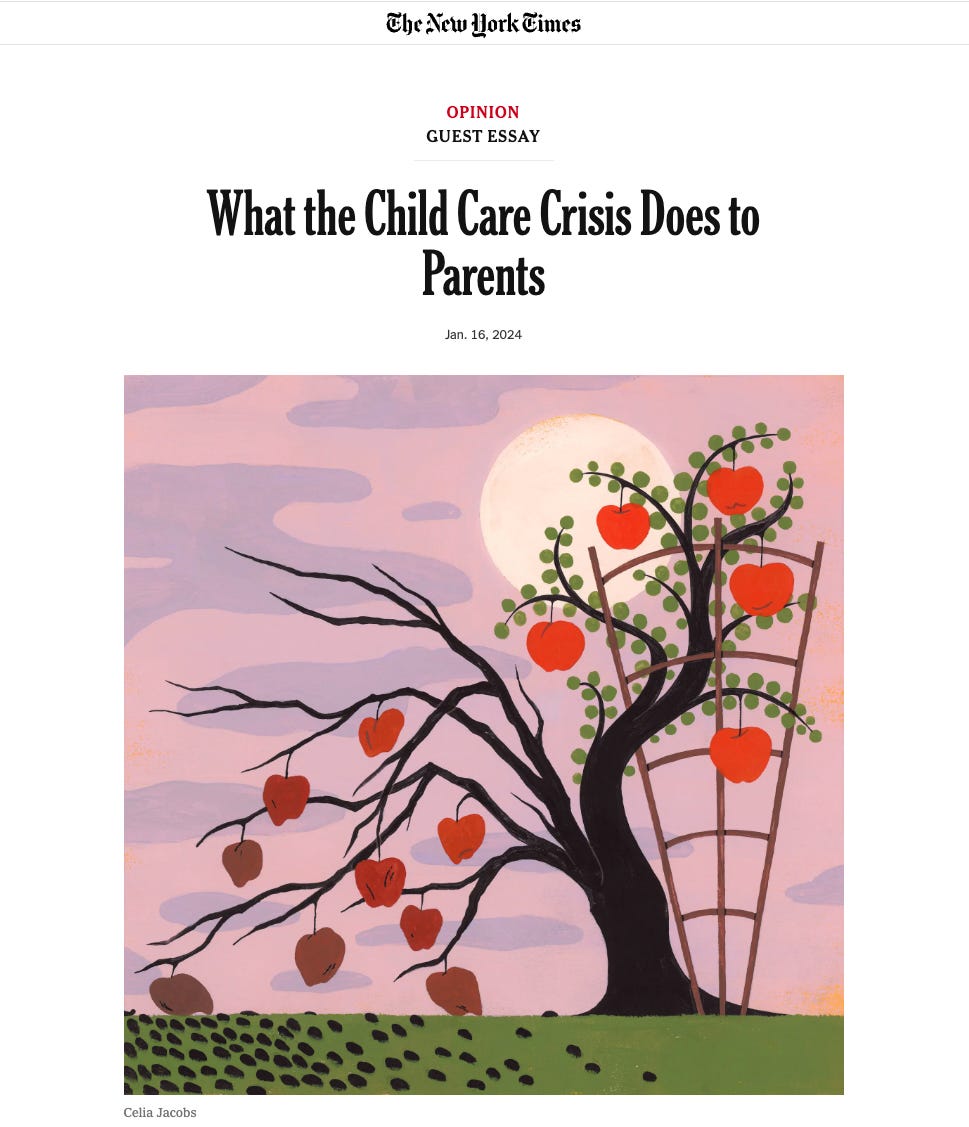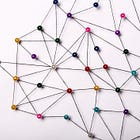“It is time to accept that child care is healthcare”
Two crises, one solution. No brainer, right?
We have a growing child care crisis. We have a growing mental health crisis. New research on child care precarity connects these two crises in a straightforward way – working towards a stable child care system will have positive impacts on maternal mental health.
It’s so obvious, right?
Honestly, the question “has no one made this argument yet?” lodged itself into my brain for years when mulling over making a case that child care is healthcare. This concept has invaded many conversations, made its way out in various forms in my writing and others, and planted the seed for the broader picture that evolved into the Maternal Stress Project.
When the country faced the child care cliff in September, my colleague and co-author, Dr.
and I felt a new sense of urgency. Lucy, a reproductive psychiatrist in New York, saw one patient after another bring up child care (or lack of) in her office. A summary from one:“I’m utterly depleted, struggling to focus on tasks, drowning in stress, and running on fumes”
Every parent has their child care story1. A story about financial strain. Or choosing between impossibly limited options. Or adding an hour of driving time to their day. Or stepping back from work to accommodate less-than-ideal hours and closure days.
We have all felt it in our bones – the stress of the bubblegum-and-duct-tape child care system in America.
Watching the slow motion collapse of an already tenuous system is terrifying on so many levels. Collapse of the child care system will affect our economy. It will set back decades of progress towards women’s advancement in the workforce and economic freedom. It will also expose many more American parents to the stressors related to child care, adding to the increased risk for mental health challenges and other stress-related ailments. We saw this effect during the pandemic. We could see it again.
Lucy and I wanted to call that out. So we put together the science behind it and published an essay for the New York Times Opinion. Concluding with:
“It is time to acknowledge that child care is directly tied to health. It is time to appreciate that stable, affordable, accessible, high-quality child care is preventive medicine for decreasing long-term health risks. It is time to value care workers and early childhood educators for the crucial services they provide. It is time to view immediate federal investment in child care as a key part of the solution to address the growing mental health crisis. It is time to fight for permanent federal investment in child care as a critical expenditure, with an exponential effect on the health of Americans for generations to come.
It is time to accept that child care is health care.”
You can read the full article here.
As will happen when tightening up writing, a lot of material hits the cutting room floor. I spent several hours listening to incredible stories of child care related stressors and, unfortunately, very few made it through to the final version. It was absolutely the right editorial decision, but to honor the time these women put in with me and their powerful stories, below are a few of the quotes that did not make the cut. They focus on the stressors related to the key factors that weigh into most child care decisions – affordability, accessibility, reliability, and quality.
Affordability of care takes the form of financial instability and hardship, both are potent stressors with links to long-term health effects. Tatiana, mother to a six and two-year old, explained the impact of this:
“[child care] is our second largest expense after our mortgage. There’s a constant back and forth and, like, a trade off. What else can we cut? It’s a very stressful, near-constant inner dialogue.”
Accessibility of care relates to space availability, distance, hours of care provided, and logistics related to balancing limited options; all add to the cognitive labor load which increases stress exposure. Lyn, mom to a four and five year old explained her situation this way:
“If [our child care center] closed, the next closest option that would fit our needs would likely be an hour round trip. There’s one other small full-time care center but it's at capacity and couldn’t absorb the need. Another option offers a half day program, but then I would need to find additional help. And that would be really hard to piece together. I’d have trouble finding availability. I don’t know how we’d do it. We really don’t have other options.”
Reliability in care ties to the psychological stress linked to unpredictability and lack of control. Liz, a single parent, told us that, if her childcare falls through:
“I can’t afford to have someone else watch them, but I also can't afford to not have my job. I’d really have to scramble.”
High quality care is often considered to be an environment that fosters child development but, when it comes to parental stress, for many this standard is as simple as having ‘safe’ conditions. Jane, mom to a six year old explained,
“I have all sorts of guilt about how my daughter spends her time [at home while I’m working, with no after school care]. But I need to fully trust someone I leave her with. It seems like the only solutions are a 12 year old babysitter or spending a lot of money and sending her across town on a bus. I have a lot of fears around safety.”
Importantly, we must consider that most of our stories only scratch the service of the stress that too many parents in America face. The overlapping, interconnected web of stressors amplify the health impacts of the child care issues stressor node.
Especially for those communities most at risk for stress-related illness. My conversation with Dr. Karen Sheffield-Abdullah PhD, MSN, CNM, FACNM, who studies health equity, stress, and anxiety as an assistant professor at the University of North Carolina at Chapel Hill, highlighted the factors and outcomes related to this risk:
“When I think about the individuals that I've talked to across a decade of community engaged research, women list children, caregiving, finances, job security as stressors. These are communities and individuals that don't have the luxury to say, ‘I guess I'm gonna have to stay home’ or ‘I guess I'm gonna have to get a nanny.’ There is no alternative plan or plan B that is easily accessible. For the person living with these hard choices, when there are less options, it’s untenable, it can feel hopeless, it can feel helpless. [Loss of child care options] will absolutely worsen and exacerbate mental health and stress-related health conditions that we already know disproportionately impact marginalized and minoritized individuals.”
While many American parents (mostly mothers) will adapt2, and a few organizations and companies will step up to soften the inevitable crash, and some states will create pockets of safety nets, the only way to reach the most impacted parents will require federal investment. Long-term federal investment to make child care affordable and accessible to ALL.
This is a fight worth fighting.
Join the fight. Use your vote. Use your voice.
Quick note about subscriptions: the Maternal Stress Project is an educational and idea-spreading initiative and I want it to be available to all. You can subscribe for free and get all posts delivered right to your inbox. However, if you feel compelled to bump up to a paid subscription, your generous support will facilitate the growth of this project… and be much appreciated!
Sharing and spreading the word is equally valuable and appreciated!
What’s your story? Share in the comments!
I’ll go first:
1. Our first child care experience was a home daycare that was one of very few places that took infants as young as four months and had open spots. As time went on, we started to notice a few concerning things but balanced those concerns with the need to extend our daughter’s time there until she could join a toddler program at another school. Within a few months of her transition out, that home daycare got shut down -- another toddler had escaped out the front door and was found wandering down the street!
2. When we went for baby #2, I figured I was all set to be a "sibling priority" at my older daughter's child care center. When I was six months pregnant, I went into the admin's office to joke about putting my fetus on the waitlist only to be met with a wide-eyed "we won't have space" reply. Apparently, there were a lot of siblings that year and they snapped up every last upcoming spot in the infant room. I had a full meltdown in the office. Placing this kid in care was supposed to be easy and I had to start from scratch again. My first thought, honestly, was "maybe the other place opened up again and they figured out how to lock the door?"
This circles right back to those effects on the economy and gender. And, adapting brings its own layers of personal stress (especially related to social narrative, workplace, financial stability) that can also affect health.




